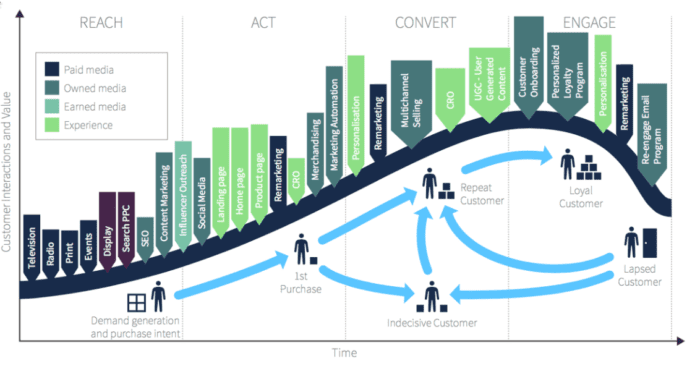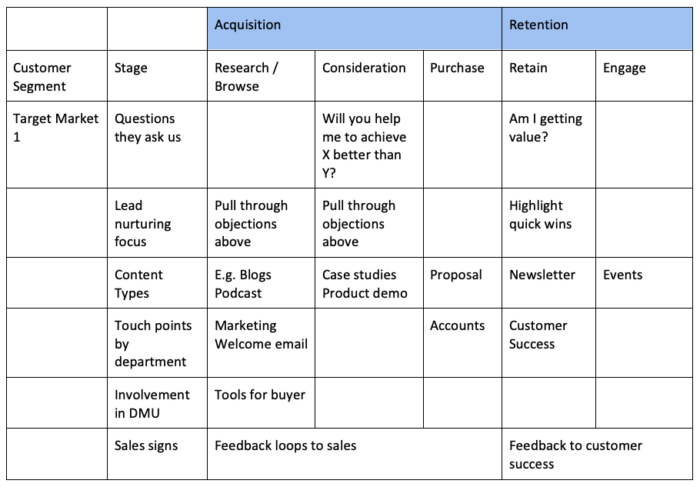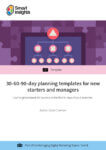The first 90 days as a marketer can tell you a lot about the business and its customers, as well as help you show what type of marketer you are
“Ergh, urm I - er, I’m not sure”.
That was me back in 2008 when I started my career in marketing and was introduced - unexpectedly - to my MD. I wasn’t expecting to bump into them, and at that moment when I was asked who I was and what I planned to do in my new role - a simple question - I lost the ability to speak.
Why hadn’t I prepared an elevator pitch for this very reason?
What a great first impression from the marketer who’d said in the interview she had the ability to communicate effectively and, as such, would be the right candidate to help craft the voice of the business.
After this, I swore I’d always prepare for whatever role I had. Of course, every role I went on to hold, within the first 90 days, I would find myself facing new ‘first experiences’.

The first time I had to:
- Manage a meeting, but was faced with a really loud person who dominated the meeting.
- Create buy-in for a new campaign and share that SEO wasn’t a ‘dark art’.
- Manage expectations when we missed lead targets.
I dread to think about how much time I spent worrying about if I’d done a good job or if I was delivering what my new boss required of me.
In fact, it’s a focus we have at Careercake, the video careers platform I work for, that creates content to help people overcome the firsts. If new hires can understand it’s okay to make mistakes, they could spend more time delivering.
Why it’s important to take on the first challenges as a new marketer
The problem is, a lot of time can be spent focusing on the ‘wrong’ parts of a new job and by doing so, can really affect the impact you have.
This article is the culmination of answers to the questions new marketers are asking us during the onboarding phase as well as the tips I wish I’d been told as that first time marketer who was longing to make a great impression.
Download our Free Resource – Marketing careers and skills development workbook
Our guide shows you how to map out your personal short-term and long-term goals, become more productive in your day-to-day work, identify your key motivators, analyze your digital marketing skills, how to leverage your strengths, and understand the different paths you can take to reach your goals.
Access the Marketing careers and skills development workbook template
So, here are eight steps for new marketers to make a great impression:
1. Understand what’s required of you (and what authority you have)
The first thing you need is to get real clarity with what your objectives are. Far too many people don’t get this from the start, which makes it difficult to understand after month one, month two and month three whether or not you’re doing what’s expected of you.
Of course, this will be determined by the level you are working at. However, you need to know where the opportunities lie as well as any restrictions there may be. It’s your job to push for this, after all, it’s your career, not your manager’s.
What are you responsible for? Are you tasked with:
- Growth marketing? (acquiring new users)
- Partner marketing? (developing relationships and opening new channels)
- Product marketing? (hits to specific product pages or sign-ups)
It is all too common for a marketer’s objectives to shift over time - more so in an SME where you’re the first marketer and the business is pivoting whilst it tries to find product-market fit. But the needle can’t keep moving: for both your sanity and the business’ success.
Agree with your manager what your focus will be within the first 90 days and set some objectives to work towards.
Avoid just looking at hard numbers, your objectives need to also address the professional development aspects. Developing and nurturing relationships, understanding the culture and learning who is who are also really important to your long term success. You’re not there just to hit marketing KPIs, after all.
2. You’re going to feel like you have to work twice as hard as everyone else
I really feel for marketers. In some businesses, we are incredibly misunderstood and can often be the discipline that works extra hard to justify a project or change in tactics. We tend to be the first out or our budgets are slashed when things get tough because a stakeholder doesn’t understand the value of our work.
Understandably, this can impact your confidence levels and feed that inner dialogue that is telling you “you’re not good enough” or “they’re going to find you’re not as good as you said you were in the interview”. It’s no wonder many marketers experience imposter syndrome.
It’s tough to remove this feeling completely but what I would suggest is set expectations from the start and understand who you can talk with if you’re feeling a little low or in need of a confidence boost.
3. Get ready to challenge your boss (professionally)
If you are the first marketer appointed in the business, there’s going to be the occasion that you have to push back on your boss because, quite simply, what they are suggesting isn’t possible.
“I want 100 leads from top FTSE companies, in the next six months, with no budget.
“Let’s sign up to this annual contract because I was told it’ll get me sales.”
“We don’t need to see what the competitors are doing."
Sound familiar?
The expectations of some bosses who may not have marketing training mean that when you come in, you’re expected to perform all sorts of miracles.
It’s not their fault, marketing may not be their bag, but if you don’t manage expectations from the outset the rest of your 90 days - and in fact tenure there - is going to be tricky.
If you find yourself in this type of situation I suggest explaining in a way that they respond best to why their suggestion may not be feasible, but always follow it up with an action plan on how to overcome it. Present them with solutions, not just problems and that’ll help alleviate some of the pain.
Download our Business Resource – 30-60-90-day planning templates for new employees and managers
By following these templates, you'll be able to record the essential information you need to fulfil your responsibilities and write down both your short-term and long-term goals.
Access the 30-60-90-day planning templates for new employees and managers
4. Get to grips with your positioning - and fast
The business you join may or may not already have its positioning nailed. Either way, it’s your job as a marketer to test it and see if it’s resonating.
You need to define what your business is and why this is important to a particular segment of customers.
Talk with a range of stakeholders to see if they recite back to you the positioning you see on the website or within presentations. If they are struggling to convey what it is the business does and what problems it is solving, you may have your work cut out for you. Importantly does this match with what customers are saying and see you?
Don’t accept poor positioning it’ll make your job so much harder.
An amazing person to follow on this is April Dunford. I’ve seen her talk many times and her no-nonsense approach to this actually makes it easier to approach.
In her words, she says: "Marketing can polish a turd. Positioning can turn a turd into fertilizer". Check out her tips on how to conduct positioning work on GrowthGenius.
5. Overcome phobias: The first time you have to make a phone call in an open plan office
We use our smartphones for everything, apart from talking to one another. We’ll order pizza, we’ll check in on social media. The frightening thing is, some of us scroll more in one day that we walk. But when it comes to talking with someone for some reason this really scares people - but it shouldn’t.
I mention this because I hear of all sorts of stories where new hires are so worried about others hearing their call they’ll go and conduct the call somewhere they ‘feel safe’. Using this example, I would suggest booking a room where you can spread yourself out and write a script.
But don’t write it word for word, I want you to colour-code different areas to help guide you where the conversation may go. Write up that first sentence where you introduce yourself or that paragraph that helps you to deal with the call if that person isn’t in. You’ll need to do this a few times but once you’ve got your flow and understand your style, it’ll be easier.
6. Talk to at least 15 customers/prospects
I love it when I see a new hire take the initiative and talk with customers to get a feel for how the brand is seen. Do this as soon as you can and follow the next few steps:
- Arrange conversations with around 15 customers or prospects.
- Arrange face to face meetings or video calls, to pick up on social cues.
- Get them talking about what problems your product solves.
Example questions to start with, based tools including the Jobs to be done framework, include:
- Tell me what was going on in your day that made you realize you needed (product).
- What would you be using if you weren’t using (product)?
- Tell me how your role would change internally if using (product) was a success.
- What is it you like about (brand)’s customer service or speed of delivery etc?
The info you collect will be important and can be used in a range of ways, from landing pages to sales scripts and more.

7. Create a customer journey map to identify quick wins
Walkthrough your customers’ journey by mapping out every step and interaction they have with your business. Start with what you know from a marketing perspective, and then go to each department and ask them for their input.
It works wonders for building those first relationships, and what’s more, this process will help you to highlight success gaps that any MD would be interested to see and act on.
Check out Hubspot’s article on creating customer journey maps.
Here’s a framework I use:

8. Create a mini action plan that will set the scene for your overall marketing plan
This should be a culmination of all of those customer interviews you’ve conducted, all those opportunities you’ve highlighted, as well as key research you’ve picked up that will meet that initial objective you’ve been tasked with owning.
I tend to work with marketers to create a mini-plan over the first three months to see how we work together, what their strengths are and to create small realistic targets. It also helps complement the testing phase of a marketing campaign and can be a great foundation for things to come.
This mini action plan pulls through elements of PR Smith’s SOSTAC® framework but seeks to set a basis of working and will be used to show your boss how you work and what support you have access to.
Stage 1:
What does the business do? What is its positioning? Who are its competitors? Is it on track to meet the targets set by the company? What are the customers saying?
Aim: You want to audit the business to understand its current situation (internal and external factors) to determine what strategy you’re going to propose.
Stage 2:
What objective are you looking to achieve (relate back to point 1)? When will you revisit and revise?
Aim: Think about the business level objective you are looking to help work towards. If you’re looking to help increase new business think about what segments you are going to market to and which metrics you’ll need to look at that will help you build momentum.
Stage 3:
What is your strategy? Is it to go after a particular market? How will you position the company? What potential activity will you drive?
Aim: Here you will use the information you collected about the customer - why they buy, how they buy and how they search for solutions like yours to pull together to create a campaign.
Stage 4.
What will you measure and control? What milestones will you look to work towards every week and month? Use this to manage expectations with your boss and ensure communication channels are open.
Summary
The first 90 days as a marketer can be tough but it’s also a great opportunity to develop both your personal brand and your ability to develop awesome work. These tips are there to help accelerate your learning and help you make an impact sooner, giving you shortcuts to some of the answers you may find you may need to thrive.
With a background in the learning, tech and recruitment industries,
Lucy Heskins, Marketing Director at
Careercake, has a track record in building marketing functions and driving marketing strategy to scale businesses.She was a finalist in the Best New Talent category in the ESTNet Wales Technology Awards 2019 and a finalist in the Wales Online Awards both for the work she's done with Careercake.











